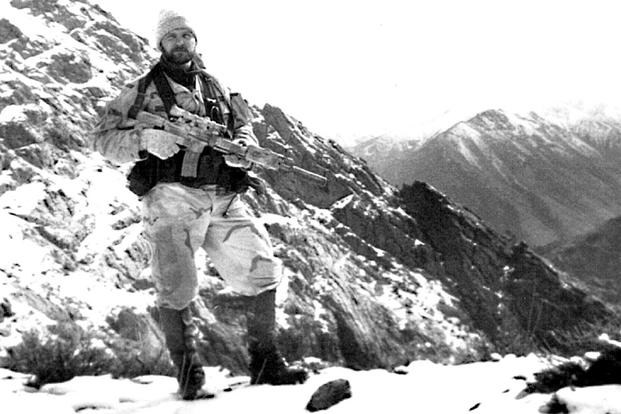President Donald Trump posthumously awarded the Medal of Honor to Tech Sgt. John Chapman at a ceremony at the White House Wednesday, marking the first time a U.S. airman has received the military's highest award for valor for operations in America's longest war.
It's also the first time an airman has received the award in nearly 50 years.
"We're gathered together this afternoon to pay tribute to a fallen warrior, a great warrior, Technical Sergeant John Chapman, and to award him the nation's highest and most revered military honor," Trump said during the ceremony. "Now, John will become the first special tactics airman to receive the congressional Medal of Honor."
The president presented the award to Valerie Nessel, Chapman's widow, in front of their two daughters Madison and Brianna, Chapman's mother Terry and sister Lori. In the audience was Air Force Secretary Heather Wilson and Chief of Staff Gen David Goldfein, as well as other service leaders and members of Congress. Former Air Force secretary Deborah Lee James, who aided in pushing Chapman's medal elevation through, was also among airmen.
Related content:
- MoH Recipient John Chapman Wasn't Left Behind By His Team, Family Says
- New Details Reveal Airman John Chapman's Heroism at Roberts Ridge
- AF Cross Recipient: 'Remarkable' Fellow Airman Up for Medal of Honor
Special tactics airmen lined the seats of the East Room for their fellow fallen airman. The official Air Force band played "I'll Be There" as guests arrived before the ceremony.
Sitting among five past Medal of Honor recipients was Britt K. Slabinski, who led the SEAL Team 6 unit up Takur Ghar mountain during the mission on March 4, 2002.
Slabinski, now a retired master chief special warfare operator, was awarded the Medal of Honor in May for his own heroism during the costly battle.
Chapman "was a very brave man, right from the beginning." Trump said. "Today it is our great honor to share his incredible story with the world."
Trump summarized the account of how Chapman had led a charge up Takur Ghar to find Petty Officer 1st Class Neil Roberts, a SEAL who was flung out of his helicopter when it crash-landed on the mountain. He fell wounded in his first assault on the enemy, but would regain consciousness and fight on. Air Force officials would determine he fought for more than an hour after his team had presumed him dead.
"Even though he was mortally wounded John regained consciousness and continued to fight on, and he really fought on. We have proof of that fight. He really fought. Good genes," Trump said. "Through his extraordinary sacrifice, John helped save more than 20 American service members, some of whom are here today."
Army Sergeant Major Raymond DePouli and special tactics Air Force Maj. Gabriel Brown were also acknowledged in the audience.
"I know that if John were here, he would attest that all the men on the mountaintop that day were heroes," Nessel said on Tuesday.
Nessel and Terry Chapman spoke to reporters outside Washington, D.C., a day ahead of her late husband's ceremony at the White House. They were accompanied by Chapman's former squadron commander, retired Col. Kenneth Rodriguez.
"It's team before self," Nessel said.
'Fully Present'
Nessel remembers the day two service members came to her door late in the evening to inform her of Chapman's death. Madison and Brianna were both young children.
"I looked through the window, and I mean, you know. There was men with uniforms standing there," she said.
Neighbors and friends started coming over. But Nessel, married to Chapman for 10 years, said it soon became a blur.
Through the years, Nessel and Terry Chapman made sure their girls would learn of Chapman's kindness and service before self -- whether in uniform or as a regular citizen.
"He'd walk through the door [fresh] off a training mission and he was daddy. Playing with Barbie dolls with them, reading stories ... he was just fully present," Nessel said. "You would never have known what he was trained to do."
After high school, Chapman enlisted in the Air Force in 1985. Born in Springfield, Massachusetts, Chapman grew up in Windsor Locks, Connecticut.
Terry Chapman remembers her son asking, "What what do you think about me joining the Air Force?"
When his mother said it was a great idea, Chapman replied, "Good, because I already enlisted."
Chapman first tried the information systems career field, but it wasn't the job for him, the two women recalled. He eventually cross-trained into the combat controller air force specialty code.
"And he loved it," Terry Chapman said. "He was born with this ability to sense people's feelings or sense when people were in need of help."
Ten years later, Chapman would find himself attached to a SEAL Team 6 unit, dubbed Mako 30, during Operation Anaconda, a full-scale attempt to clear the Shah-i-Kot Valley of al-Qaida and Taliban forces. The team's task was to establish an outpost atop Takur Ghar at 11,000 feet in thigh-deep snow.
Chapman, 36, died during the mission in Afghanistan in 2002. But Chapman's final fight, where he ran from cover to usher in an Army Ranger team on a MH-47 Chinook, occurred well after the special tactics airman had already been presumed dead.
"He was shot, and fell to the ground and lost consciousness," Trump said Wednesday.
New evidence from a 30-month Pentagon-led investigation proved Chapman lived for more than an hour after the SEAL team he was attached to left.
"In this final act of supreme courage, John gave his life for his fellow warriors," Trump said.
"Before he was deployed, he said, 'I will do everything that is humanly possible to back my team,'" Terry Chapman said of her son.
"And he did that and more," she said.
-- Oriana Pawlyk can be reached at oriana.pawlyk@military.com. Follow her on Twitter at @oriana0214.
















